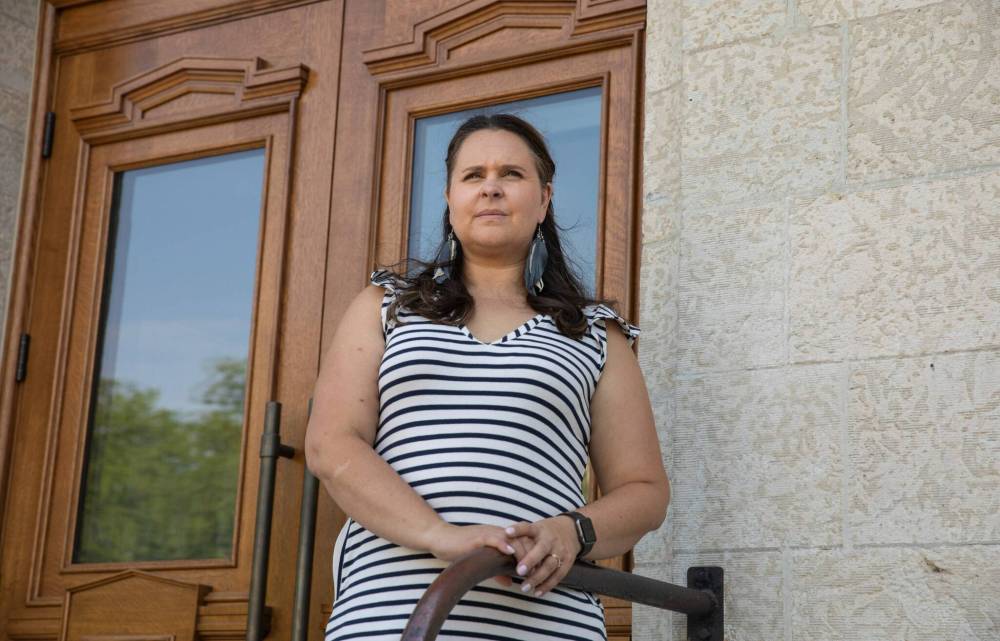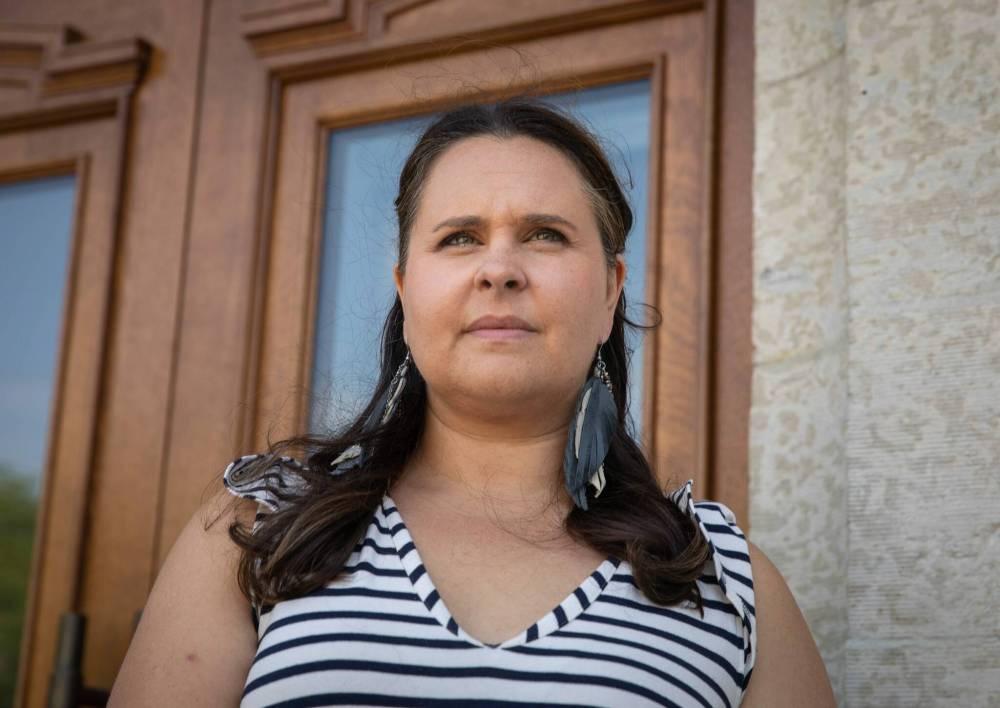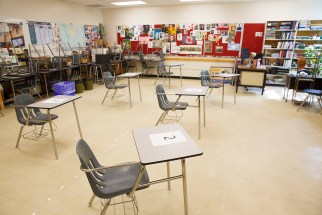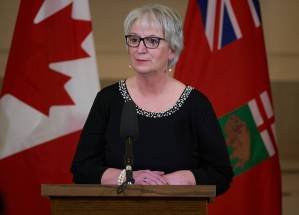Non, merci: High demand, lack of supports pushing French-language teachers away Significant number of new instructors in anglo-dominated schools work in ‘pressure-cooker’ classrooms, local researcher says
Read this article for free:
or
Already have an account? Log in here »
To continue reading, please subscribe:
Monthly Digital Subscription
$0 for the first 4 weeks*
- Enjoy unlimited reading on winnipegfreepress.com
- Read the E-Edition, our digital replica newspaper
- Access News Break, our award-winning app
- Play interactive puzzles
*No charge for 4 weeks then price increases to the regular rate of $19.00 plus GST every four weeks. Offer available to new and qualified returning subscribers only. Cancel any time.
Monthly Digital Subscription
$4.75/week*
- Enjoy unlimited reading on winnipegfreepress.com
- Read the E-Edition, our digital replica newspaper
- Access News Break, our award-winning app
- Play interactive puzzles
*Billed as $19 plus GST every four weeks. Cancel any time.
To continue reading, please subscribe:
Add Free Press access to your Brandon Sun subscription for only an additional
$1 for the first 4 weeks*
*Your next subscription payment will increase by $1.00 and you will be charged $16.99 plus GST for four weeks. After four weeks, your payment will increase to $23.99 plus GST every four weeks.
Read unlimited articles for free today:
or
Already have an account? Log in here »
Hey there, time traveller!
This article was published 22/08/2022 (1203 days ago), so information in it may no longer be current.
New research suggests beginner French-language teachers are entering “pressure-cooker” classrooms and need relief to continue working in the K-12 sector as demand for their specialty services surges.
Université de Saint-Boniface’s Marie-Élaine Desmarais recently led a small exploratory study with a goal of determining why so many early career educators in français and French-immersion settings quit their jobs soon after they begin.
“When we are in a minority context, we have less teachers right from the get-go, especially here in Manitoba, or in Ontario, or wherever the anglophones are dominant,” said Desmarais, principal investigator on the research project. “We cannot afford to lose them.”
Six per cent of teachers in francophone-minority schools leave the profession within five years of being hired, per the Fédération nationale des conseils scolaires francophones (FNCSF), which represents French-language school boards across Canada.
JESSICA LEE / WINNIPEG FREE PRESS An associate professor who studies well-being in schools, Marie-Élaine Desmarais said she was determined to find out why some early career teachers are not content at work, in order to prevent burnout before it is too late.
While that number may appear minimal, Desmarais said it’s significant due to both the existing shortage of français and immersion teachers and surging demand for French-language programs. It’s also on the lower scale of research estimates on the subject, she said.
Over the last decade, French-immersion enrolment in Manitoba has surged by 47 per cent while the francophone district has recorded a 19 per cent increase. English programs have grown two per cent during that period.
“French school boards are the victims of their own success,” states a recent report by the FNCSF in which the organization identifies a “desperate need” for qualified educators nationwide. By the association’s count, 60 new French schools opened in Canada between 2016 and 2021.
An associate professor who studies well-being in schools, Desmarais said she was determined to find out why some early career teachers are not content at work, in order to prevent burnout before it is too late. “We know that if the teachers (are) well in school and if he is happy, then more than likely, his students will be,” she said.
“French school boards are the victims of their own success.” – FNCSF report
The Winnipeg-based researcher and colleagues across the country interviewed eight Canadian French-language teachers who were either thinking about quitting or had already left their jobs. They also recruited a range of school administrators and education faculty members.
No matter their location — be it New Brunswick or Manitoba, the respondents shared similar, stark experiences.
One of the common themes was an overwhelming feeling of responsibility, with respondents feeling immense pressure from all parties: principals, parents, students and colleagues. In Desmarais’ words, “They felt like a pressure-cooker.”
The new teachers were not complaining about working evenings and weekends, which all of them did regularly, but rather they were complaining about feeling isolated and unable to meet the demands required of them to ensure they could help all students, the researcher said.
The absence of substitute teachers and excessive planning required to do their jobs were among other issues that drained participants at work.
”They felt like a pressure-cooker.” – Marie-Élaine Desmarais
While the researchers did not ask any questions specifically about COVID-19, the pandemic was often brought up by respondents who indicated it exacerbated longtime challenges.
When asked what would make a difference, the beginner teachers indicated they wanted more opportunities to try out classroom strategies and reflect during their practicums. Upon entering the workforce, they disclosed a desire for an improved sense of collegiality at school, smaller class sizes and ongoing professional development.
Desmarais’ team has created a list of recommendations for all stakeholders in the hopes of combatting high attrition.
According to their list, in order to better prepare graduates, education faculties need to increase requirements for successful internships, facilitate individual professional development plans to oversee self-management and provide varied practicum experiences.
“It’s not necessarily longer practicums, it’s more efficient ones,” Desmarais said.
JESSICA LEE / WINNIPEG FREE PRESS Desmarais also questioned why the culture in schools is to welcome freshly minted teachers with the most difficult assignments and, often, ones that do not align with their expertise.
The suggestions call on employers to create formal coaching and mentorship programs for incoming staff members and provide mentors with ongoing training, as well as offering all staff members wellness-centred professional-development sessions.
Desmarais also questioned why the culture in schools is to welcome freshly minted teachers with the most difficult assignments and, often, ones that do not align with their expertise.
The teacher shortage’s impact is varied, but ultimately, participants in the research study agreed students and their learning are negatively affected by it.
“Teachers who stay in the profession are assigned more and more demanding tasks. The amount of work and the expectations placed on them increases, and so does their level of occupational stress. Thus it becomes increasingly difficult for them to maintain a steady and balanced level of daily professional functioning, since a significant amount of energy needs to be directed towards stress management,” states a summary paper on the study.
The research project was funded by the Association des collèges et universités de la francophonie canadienne via a larger federal French language program supported by Canadian Heritage.
maggie.macintosh@freepress.mb.ca
Twitter: @macintoshmaggie

Maggie Macintosh reports on education for the Winnipeg Free Press. Funding for the Free Press education reporter comes from the Government of Canada through the Local Journalism Initiative.
Our newsroom depends on a growing audience of readers to power our journalism. If you are not a paid reader, please consider becoming a subscriber.
Our newsroom depends on its audience of readers to power our journalism. Thank you for your support.








